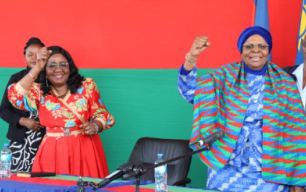Balancing efficiency and equity: Middleman removal must be approached with caution

In a commendable and bold move aimed at streamlining public spending and ensuring better value for taxpayers’ money, the Government of the Republic of Namibia (GRN) has recently eliminated middlemen from the procurement of medicines and clinical supplies. This decision, announced by Health and Social Services Minister Esperance Luvindao, is projected to save the ministry over N$221 million by procuring directly from international manufacturers and wholesalers. While this step addresses longstanding inefficiencies in the supply chain where intermediaries have often inflated costs and contributed to medication shortages, it must not come at the expense of empowering local businesses, particularly those owned by black Namibians. To do so blindly would risk perpetuating the economic disparities entrenched by apartheid, undermining the progressive policies of affirmative action and Black Economic Empowerment (BEE) that have been central to Namibia’s post-independence transformation. Instead, the GRN should prioritize accountability, compliance, and quality assurance to foster an inclusive economy that lifts the previously disadvantaged without compromising fiscal prudence.
Namibia’s economic landscape cannot be understood without reckoning with its colonial and apartheid past. Under South African rule, which enforced apartheid policies until independence in 1990, the country’s resources were systematically exploited to advance the socio-economic interests of the white minority. Discriminatory laws restricted black Namibians’ access to education, land, employment, and capital, creating a segregated economy where white-owned enterprises dominated key sectors like mining, agriculture, and commerce. This “whites-only empowerment project,” as it has been aptly described, funneled national wealth into a privileged few, leaving the majority black population in poverty and marginalization.
Even three decades after independence, these inequalities persist. Namibia remains one of the world’s most unequal societies, with a Gini coefficient hovering around 0.59, reflecting stark divides in income and wealth distribution. White Namibians, who constitute less than 7% of the population, still control a disproportionate share of productive assets, including farmland and businesses inherited or built during the apartheid era. The economy continues to be shaped by what can be termed “apartheid architects”, those who benefited from the regime’s policies and whose enterprises stand on foundations of exclusion. Poverty rates among black households remain high, exacerbated by limited access to opportunities, while socio-economic mobility for the previously oppressed is stymied by these structural barriers. Ignoring this history in policy reforms like the pharmaceutical procurement changes would not only be shortsighted but could unravel the hard-won gains of the liberation struggle.
The Role of Affirmative Action and BEE: Tools for Redress, Not Relics
In response to this legacy, Namibia has implemented affirmative action and BEE-inspired policies to deliberately empower black citizens and other disadvantaged groups. The Affirmative Action (Employment) Act of 1998 mandates equitable representation in workplaces, requiring employers to submit plans for hiring and promoting previously disadvantaged individuals. Building on this, the New Equitable Economic Empowerment Framework (NEEEF), often likened to South Africa’s Broad-Based Black Economic Empowerment (BBBEE), seeks to promote ownership, management control, and skills development for black Namibians across sectors. These measures are not mere handouts but constitutional imperatives rooted in Article 23 of the Namibian Constitution, which allows for affirmative action to redress past imbalances.
However, these policies have faced valid criticisms, including instances of elite capture where benefits accrue disproportionately to a politically connected few rather than fostering broad-based empowerment. In the pharmaceutical sector, for instance, local black-owned suppliers have historically been middlemen, providing a foothold in an industry otherwise dominated by international giants or white-established firms. Cutting them out without safeguards could exacerbate unemployment and economic exclusion among black entrepreneurs, who often lack the capital or networks to compete directly with global manufacturers. Namibia’s small market size makes complete elimination of intermediaries unrealistic, as direct procurement may not always be feasible or cost-effective in the long term. The GRN must therefore continue deliberate efforts to uplift the previously disadvantaged, ensuring that reforms do not inadvertently reinforce the dominance of apartheid-era beneficiaries.
While affirmative action and BEE remain essential, it is also high time that their beneficiaries graduate from perpetual reliance on the GRN “ the until death do us part mantra”, and begin making meaningful contributions to the broader economy. Empowerment should not create a class of eternal dependents but rather self-sustaining entrepreneurs who stand on their own feet, supporting emerging small and medium enterprises (SMEs), and plough back into their communities. Rightfully so, critics have long pointed out that BEE in Namibia has sometimes enriched a small elite, often referred to as “fat cats”, without trickling down benefits to the masses, leading to accusations of elite capture and cronyism.
Take, for example, a prominent black Namibian billionaires and multi-millionaires, whose business empires have been benefiting from GRN since 1990, yet there is nothing to show for apart from multi-million dollar mansions while only employing 2-3 three employees who are under paid and with no benefits. For instance, why should there be no clinic, school, or community resource center in a village that produced a billionaire? These empowered individuals must shift from ostentatious spending on flashy cars and slayqueens to investing in factories and industries that truly contribute to economic growth, create sustainable employment for Namibians, and address pressing social needs.
Sustainable empowerment demands that beneficiaries mentor and finance emerging SMEs, fostering a ripple effect of prosperity rather than hoarding wealth. GRN can facilitate this transition by incorporating time-bound support mechanisms into BEE policies, such as phased-out preferences for established firms, coupled with incentives for community reinvestment and job creation. This approach would ensure that empowerment evolves from redress to resilience, aligning with Namibia’s Vision 2030 goals for inclusive and sustainable development.
I therefore reiterate that, rather than a blanket rejection of local involvement, GRN should refine its approach to procurement by emphasizing quality, compliance, and accountability. The recent shift to direct sourcing under emergency provisions of the Public Procurement Act is commendable for addressing overpricing and shortages, but it should be paired with mechanisms to integrate empowered local businesses where they add value, such as in distribution, logistics, or value-added services. This means rigorously enforcing existing policies: holding contractors accountable for delivery, imposing penalties for non-compliance, and conducting transparent audits to ensure value for money.
For example, the government could mandate that a portion of procurement contracts be reserved for black-owned enterprises that meet stringent quality standards, thereby balancing efficiency with equity. Strengthening institutions like the Employment Equity Commission and the NEEEF oversight bodies would help monitor progress and prevent abuse. Moreover, investing in capacity-building through training, financing, and partnerships, would enable local firms to compete globally, reducing reliance on middlemen while fostering sustainable empowerment.
It is imperative that GRN does not shy away from its role in black economic empowerment. As Her Excellency President Dr. Netumbo Nandi-Ndaitwah has emphasized in related announcements, direct procurement is about fiscal responsibility, not exclusion. By focusing on outcomes, ensuring medicines are affordable, accessible, and of high quality, the government can honour the revolution’s promise without repeating apartheid’s sins. To cease empowering the disadvantaged would be to betray the very foundations of an independent Namibia. In conclusion, while cutting middlemen is a necessary reform, it must be implemented with eyes wide open to history’s lessons. Affirmative action and BEE are not obstacles to progress but vital bridges to a truly equitable society. By prioritizing accountability, sustainable contribution, and deliberate inclusion, Namibia can secure both health for its people and justice for its past.
-Taddeus Shithigona is a Member of the Central Committee of the SWAPO Party Youth League and holds a Bachelor’s Degree in Criminal Justice and is currently pursuing a Master’s Degree in National Security Studies with the Renmin University of the People’s Republic of China
- 1265 views










Comments